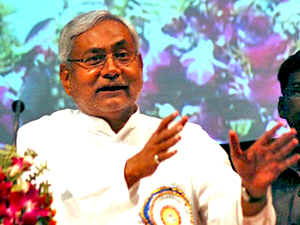 Patna, Jun 15: Bihar chief minister Nitish Kumar has set his terms for staying in the NDA. He has asked the BJP to publicly declare that Narendra Modi will not be its prime ministerial candidate in the 2014 elections. Since BJP can't give such an undertaking, a parting of ways between it and JD(U) is now expected in a day or two.
Patna, Jun 15: Bihar chief minister Nitish Kumar has set his terms for staying in the NDA. He has asked the BJP to publicly declare that Narendra Modi will not be its prime ministerial candidate in the 2014 elections. Since BJP can't give such an undertaking, a parting of ways between it and JD(U) is now expected in a day or two.
Speaking to media, Nitish Kumar said: "They (the BJP) will have to address our basic concern immediately and in public. Private assurances will not do." While he didn't mention the Gujarat CM by name, there is no ambiguity whatsoever about what he meant by "basic concern".
JD(U) has publicly proclaimed that only a "secular" person, who does not have rough edges in his personality and can pull everyone along, is fit to be the country's prime minister. It has also held that Modi does not fulfil the eligibility criteria.
As BJP is likely to find it impossible to meet the condition, considering the groundswell for Modi among the party cadre, the 17-year-old partnership between it and JD(U) is on the rocks. This is an unavoidable reality and split in the NDA is now inevitable by Monday.
Both Nitish Kumar and his colleague, JD(U) chief Sharad Yadav, recognize the inevitability of Gujarat leader being anointed BJP's choice for country's top political job, and has conveyed their assessment to BJP leaders, — among them, L K Advani, Rajnath Singh, Sushma Swaraj, Nitin Gadkari — who have appealed to the JD(U) to not precipitate matters.
They also don't subscribe to the optimism of Modi's opponents that his projection as PM candidate was not a done deal yet. "The way it has been hailed and celebrated by the BJP leaves no doubt whatsoever that his appointment as the chairman of the campaign committee is a key step towards Modi's projection as the party's PM candidate," said a JD(U) source.
According to political sources here, Nitish Kumar has responded to Advani's plea for a reconsideration of the JD(U)'s imminent departure from NDA by saying that he doubted anybody in the BJP could now thwart Modi's march to the top of his party.
"They (BJP leaders calling JD(U) leaders) all come off as helpless to stop what is unfolding, leaving us with no option but to chart out our independent path," said a senior JD U source familiar with the conversations that BJP leaders have had with Nitish Kumar and Sharad Yadav.
Sushma Swaraj's effort on Friday when she, according to JD(U) sources, invoked anti-Congressism to get Nitish Kumar to back off from his plan to withdraw from the NDA, failed to concinve the CM.
JD(U) will start rolling out the withdrawal drill after Sharad Yadav reaches here to explain to party legislators and functionaries why the JD(U) is compelled to break away. The exercise will be a formality, considering that all the important leaders favour a withdrawal from the NDA. In any case, Nitish Kumar and Sharad Yadav, who were authorised by the party in April to take the final call, are clear that their vparty won't have any truck with a Modi-led BJP.





Comments
Add new comment